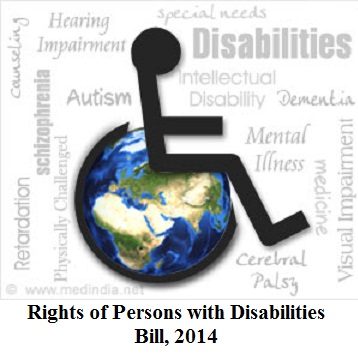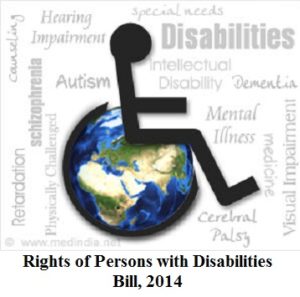The Rights of Persons with Disabilities Bill, 2014, which aims at securing and enhancing the rights and entitlements of disabled persons was passed with amendments in the Rajya Sabha on December 14, 2016.
- The bill will replace the Persons with Disabilities (Equal Opportunities, Protection of Rights and Full Participation) Act, 1995.
- The amended Bill also complies with the United Nations Convention on Rights of Persons with Disabilities, which was signed by India in 2007.

- The legislation was drafted on the basis of the recommendations of the Sudha Kaul Committee, under the Ministry of Social Justice and Empowerment and the Bill was introduced by the Union minister for social justice and empowerment Mallikarjun Kharge.
Important Features of the Bill
Bill will benefit larger group of disabled people :
Based on the 2011 Census, India accounts for about 2.68 crore or 2.21 per cent of the population as disabled. The new bill will make larger number of people eligible for rights and entitlements since it recognises more number of disablities as compared to the 1995 Act.
19 disabilities recognized against previous 7
The new bill covers total 19 disabilities instead of seven disabilities specified in the 1995 Act. Along with the 7 recognised disabilities — blindness, low vision, leprosy-cured, hearing impairment, locomotor disability, mental retardation and mental illness, the 2014 Bill also included cerebral palsy, haemophilia, multiple sclerosis, autism and thalassaemia among others.
- Besides, two other disability recognized was from acid attacks and Parkinson’s Disease.
- The Bill also provides the provisions to allow the central government to notify any other condition as a disability.
Allows 5% reservation from earlier 3%
The Bill states that any individuals suffering from at least 40 per cent of a disability will be defined as Person with Disability and will be entitled to get the benefits like reservations in education and employment, preference in government schemes and others.
- The 1995 Act provided only 3 per cent reservation for the disabled in higher education institutions and government jobs, 1% each for the physically, visually and hearing-impaired persons but the 2014 Bill has raised the limit to 5 per cent by adding 1 per cent each for mental illnesses and multiple disabilities.
Rights of the PWD
The Bill provides for all the establishments (Public and Private) to ensure that persons with disabilities are provided with barrier-free access in buildings, transport systems and all kinds of public infrastructure including hospitals and polling booths.
- They should not be discriminated on any ground and was provided the right to protection from inhuman treatment or harassment and equal protection and safety in situations of risk, humanitarian emergencies, natural disasters and armed conflict.
Setting up National Commission for Persons with Disabilities
The new Bill provides for setting up National Commission for Persons with Disabilities, which will have statutory powers to inquire any matter that is inconsistent with the Act and also monitor the proper utilization of funds for PWD.
- Besides, the Bill also recommends establishing a dedicated National Fund for Persons with Disabilities that will be utilized for the benefit of disabled persons.
Bill lays provision of guardianship
According to the Bill, the District courts may provide two types of guardianship for mentally ill persons.
- It includes limited guardian to take joint decisions with the mentally ill person and the plenary guardian to take decisions on behalf of the mentally ill person, without consulting them.
Legal action for violating the Act
The Bill also includes penalty for violating the rules of the Act which was not present in 1995 Act.
- The 2014 Bill provides punishment with a jail term of up to 6 months, and/or a fine of Rs 10,000 in case of violating any provision of the Act.
- Subsequent violations will be punishable with a jail term of up to 2 years and/or a fine of Rs 50,000 to Rs 5 lakh.
- However, the current amendments to the Bill propose to remove the jail term entirely, and only keep fines for breaking the law.






